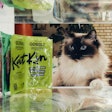
A review of research on alpha-lipoic acid supplements collected evidence that the chemical can benefit dogs health in various ways. However, cats have greater sensitivity to the compound, and it may be toxic to them at relatively lower dosages than dogs.
“A review of canine studies supports that a-LA is safe, well tolerated and effective as a nutritive additive in dog food within the range of concentrations used resulting in an exposure of 2.7 to 4.94 mg/kg body weight/day,” researchers with Hill’s Pet Nutrition wrote in their meta-analysis published in the journal Animals.
Benefits of alpha-lipoic in dog food
The researchers presented a collection of studies supporting that alpha-lipoic acid has antioxidant, anti-inflammatory benefits for dogs, while protecting their nervous system, at dosages well below the toxic level. Alpha-lipoic acid supplementation helped dogs with cataracts related to diabetes. The compound also enhanced glucose metabolism, reduced insulin resistance and improved symptoms related to diabetes. Alpha-lipoic acid also may reduce cognitive dysfunction and improve learning in senior pets, while reducing biomarkers for osteoarthritis. Dogs involved in the various reviewed studies didn’t remained healthy, didn’t fluctuate in weight or experience adverse health effects.
The way dogs eat alpha-lipoic acid has an effect on how much of the chemical ends up in their systems. Oral supplementation resulted in higher absorption of the compound, compared to when it was included in an extruded dog food. Nevertheless, concentrations of alpha-lipoic acid in dogs’ blood increased in proportion to the dosage, regardless of the mode of delivery.
However, for cats, the researchers didn’t find much published research about its benefits. Instead, they found evidence that the too much alpha-lipoic acid could cause liver and kidney damage, with a maximum tolerated dose of 13 mg/kg of body weight. The researchers concluded that cats may be extremely sensitive to alpha-lipoic acid when compared to dogs, rats or humans.
Ingredient Issues on alpha-lipoic acid in pet food
The results of the meta-analysis echoed what Greg Aldrich, PhD, Kansas State University professor, wrote in Petfood Industry’s column Ingredient Issues.
“Alpha-lipoic acid is being formulated into a few commercial pet food products on the market today, and there are implications that brain function and cognition are improved as a result of its consumption by dogs,” Aldrich wrote. “However, the jury is still out for cats. It may have to do with finding the right dosage for cats or it could be that the compounds are not compatible with the metabolism of a true carnivore.”















